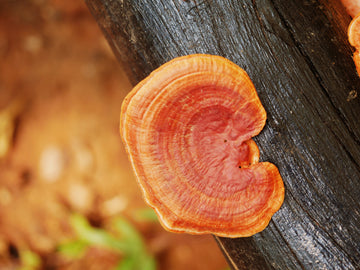By Nikhail Thakker, Dr. Christine Wong, PhD
You’ve probably seen mushrooms in the form of a pizza topping, or heard of its uses as a psychedelic, but did you know that some mushrooms have historically made a name for themselves as an immunity-boosting, nootropic, and adaptogenic powerhouse? Introducing Reishi, a unique fungus species that has served not just as a symbol of health and wealth, but as a supplement to similar effect.
What is Reishi, and where is it from?
Reishi, also known as Lingzhi, or scientifically as Ganoderma lucidum, is a mushroom that thrives in hot and humid conditions is native to East Asia and parts of Canada and has been proven to be a fungal phenom, exhibiting nootropic and adaptogenic properties, immunity boosting improvements, as well as plenty of other remarkable benefits for the human body and mind.
ARTWORK BY SUIGETSU SHONIN, EAST ASIA LIBRARY STANFORD UNIVERSITY
Reishi symbolizes immortality in the realm of Traditional Chinese medicine (TCM) and is believed to supplement longevity (1). The fabled mushroom has also been regarded as a token that represents success and well-being, signifying vitality. It’s been documented as a talisman of Taoism, with uncovered artwork featuring Reishi dating back as far as 1400 AD.
Reishi has been a perpetual staple in Traditional Asian Medicine (2), in addition to garnering interest by cancer researchers for its healing properties. In fact, its history consists of use in treatment for respiratory issues as well as high blood pressure (3). Sound like something you might need to get your hands on? Stick with us as we delve into the studies that investigate its other mind-sparking capabilities.

PHOTOGRAPH BY BENIS ARAPOVIC, VECTEEZY
What are the benefits of Reishi?
Increased Antioxidant Capacity
Reishi is rich in antioxidants – compounds, often sourced naturally, that counteract the dangers of free radical compounds that enter your system. Free radicals are harmful byproducts of metabolism or toxic gaseous compounds in the atmosphere, which when fought off by antioxidants, protect the vitality of your mind and body. The polysaccharide compounds in Reishi, or in other words its natural carbohydrates, exhibit these protective properties (1, 3).
Combats Anxiety and Depression
Reishi is composed of many beneficial bioactive components such as triterpenoids and polysaccharides, such as Ganoderic acid. Studies have found that Ganoderic acid can support the brain and the nervous system, improving anxiety and depression (7).
PHOTOGRAPH BY THANAKORN PHANTHURA, VECTEEZY
Immunity and Sleep Support
Your ability to fight off illnesses is more closely related to your sleeping habits, and in turn your ability to think clearly, than you might think.
There are few experiences more frustrating than ruling yourself out of action when a flu gets you down. The inflammation that induces discomfort you may have can be relieved with, you guessed it, Reishi extract. Its immunomodulating properties, or simply its ability to alter immune responses in the body, include the activation of immune cells called lymphocytes, which produce antibodies to fight illnesses (5).
Reishi Ganoderma extracts also contain compounds that interact with the TNF gene, which can modulate your daily rhythms and sleep (4). Improvement in sleep quality and heightened TNF expression resulting from compounds in the Reishi extracts has been shown to also lead to liver protection and reduction in bad cholesterol — that’s whole mind-body benefits for you!

PHOTOGRAPH BY MANASSANANT PAMAI, VECTEEZY
Fatigue Reduction
Reishi’s use as a remedy for fatigue is equally intriguing. A study done on patients of neurasthenia, a medical condition characterized by chronic laziness and lethargy, treated subjects with Reishi extract over an 8 week period, and noticed improvements of up to 28.3% in fatigue-measuring metrics (6). Although the improvement in well-being was in said patients, it is a promising indicator that Reishi may having similar effects in healthy individuals.
Have you heard of Flojo’s Mushroom Drinks?

The marvels of modern day medicine are truly remarkable, but sometimes, just as in the case of Reishi, tradition stands up to the test of time. If you’re looking to feel the fatigue fade away from your day, try Flojo drinks for a refreshing productivity boost, featuring Reishi extract, a star ingredient of an expertly formulated, all-natural blend of nootropic and adaptogenic herbs.
Works Cited
1. Sissi Wachtel-Galor; Tomlinson, B.; Iris. Ganoderma Lucidum(“Lingzhi”), a Chinese Medicinal Mushroom: Biomarker Responses in a Controlled Human Supplementation Study. British Journal Of Nutrition 2004, 91 (2), 263–269. https://doi.org/10.1079/bjn20041039.
2. Ganoderma, Description, Fungus, Pathogen, Parasite, Saprotroph, Medicinal, & Facts, Britannica. Encyclopædia Britannica; 2024.
3. Darija Cör; Knez, Ž.; Maša Knez Hrnčič. Antitumour, Antimicrobial, Antioxidant and Antiacetylcholinesterase Effect of Ganoderma Lucidum Terpenoids and Polysaccharides: A Review. Molecules 2018, 23 (3), 649–649. https://doi.org/10.3390/molecules23030649.
4. Qiu, Y.; Mao, Z.-J.; Ruan, Y.-P.; Zhang, X. Exploration of the Anti-Insomnia Mechanism of Ganoderma by Central-Peripheral Multi-Level Interaction Network Analysis. BMC Microbiology 2021, 21 (1). https://doi.org/10.1186/s12866-021-02361-5.
5. Lull, C.; Wichers, H. J.; Huub F. J. Savelkoul. Antiinflammatory and Immunomodulating Properties of Fungal Metabolites. Mediators of Inflammation 2005, 2005 (2), 63–80. https://doi.org/10.1155/mi.2005.63.
6. Tang, W.; Gao Y.; Chen G.; He G. A Randomized, Double-Blind and Placebo-Controlled Study of a Ganoderma lucidum Polysaccharide Extract in Neurasthenia. J. Med. Food 2005, 8 (1), 53–56. https://doi.org/10.1089/jmf.2005.8.53.
7. Mi, X., Zeng, G.-R., Liu, J.-Q., Luo, Z.-S., Zhang, L., Dai, X.-M., Fang, W.-T., Zhang, J., & Chen, X.-C. (2022). Ganoderma lucidum triterpenoids improve maternal separation-induced anxiety- and depression-like behaviors in mice by mitigating inflammation in the periphery and brain. Nutrients, 14(11), 2268. https://doi.org/10.3390/nu14112268






